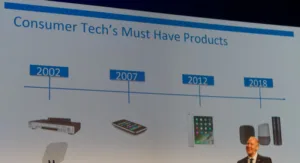CES used to have a ‘death by Powerpoint’-style event just before the opening of the event when they would bombard us with data about the markets. However, the CTA, which runs CES has changed the event to become less data-driven (and, as we reported from CES, that the CTA is no longer working with GfK on data, which limits its access to global data).
Keynote on the CES Market
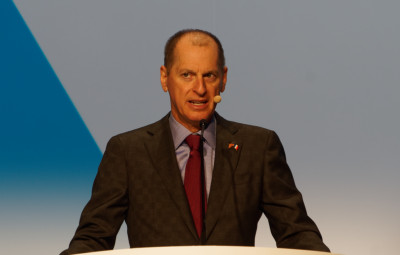 Gary Shapiro started by saying that there has been a 55% increase in presence of French companies at CES in Las Vegas over the last couple of years. La French Tech, which backs start-ups, has been a good partner for the event and is providing a lot of help with innovation. Shapiro also highlighted the personal interest shown by President Macron of France in the event and in promoting French technnology.
Gary Shapiro started by saying that there has been a 55% increase in presence of French companies at CES in Las Vegas over the last couple of years. La French Tech, which backs start-ups, has been a good partner for the event and is providing a lot of help with innovation. Shapiro also highlighted the personal interest shown by President Macron of France in the event and in promoting French technnology.
The CTA has a range of attributes to look at and ranks the friendliness to innovation of various countries and Shapiro said that CES recognises France as a positive country for innovation and his new book has a complete chapter on innovation in the country. (The book, as with his previous one, was heavily plugged at the event.)
The CTA surveyed 14,000 consumers across Europe and Asia and found that French consumers are reluctant to allow access to their data, but want control of that data. However, they are happy to share data on health if it helps others, and more open to sharing health data than, for example, US consumers.
Today’s technology allows a lot more flexibility for start-ups because they can take advantage of a wide range of services and cloud platforms to minimise the need for capex and to maintain flexibility. Technology also allows communication in times of emergency, Shapiro said. In 2019, a new focus at the CES Las Vegas event is “Resilience” – in four areas of energy supply, health care, cybersecurity and ‘safety and recovery’.
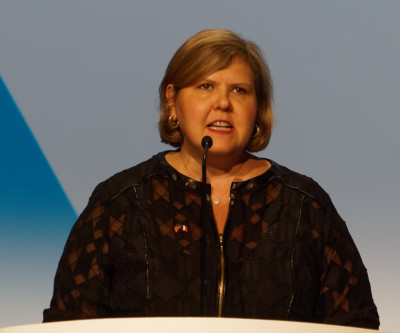 Karen Chupka, EVP of CES then came on stage to talk about the Las Vegas event. More than 155 countries and regions will be represented in 2019. In 2018, there were 5500 visitors to CES from France. In 2019, the scope First time exhibitors will include agricultural machinery maker, John Deere, which has a new technology offer (although how this is consumer-related remains to be seen).
Karen Chupka, EVP of CES then came on stage to talk about the Las Vegas event. More than 155 countries and regions will be represented in 2019. In 2018, there were 5500 visitors to CES from France. In 2019, the scope First time exhibitors will include agricultural machinery maker, John Deere, which has a new technology offer (although how this is consumer-related remains to be seen).
Chupka announced that the second keynotes speaker at CES would be Lisa Su, CEO and President of AMD.
At 2018, smart speakers took over the event and Chupka expects even more of those products in 2019. There is a boost to the Smart Cities focus with a lot of interest in 5G at the event. Transportation will continue to be a big topic with 150 exhibitors from the automotive segment taking a lot of space in the North Hall. The transportation revolution is not just about autonomous cars, she said – Bell Helicopter announced an Air Taxi at last year’s event.
There will be 100 companies in the medical technology area in January. The Eureka Park for start-ups continues to be an important part of CES and Le French Tech is expected to bring 300 French start-ups to the event. eSports will also have a dedicated area. Chupka said that it has always been an aim of CES to ensure that ‘any company can attend’ and in this they have done well with the Eureka park area – it’s an area we always enjoy looking around and reporting on.
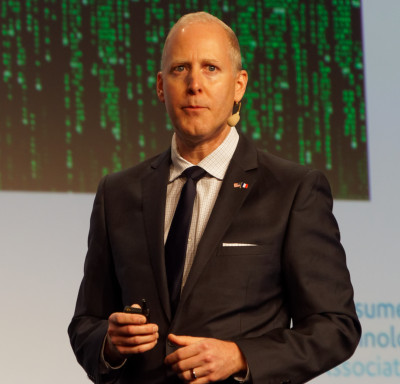 Next to speak was Steve Koenig, VP of Market Research, of the CTA who started by saying that a lot of us take our connectivity for granted these days. The current connected age was built on the digital age. Now we are in the data age and there will be lots of changes related to this and privacy and security are becoming increasingly important. Koenig quoted Brian Modoff of Qualcomm “Spent the last thirty years connecting people, next thirty years connecting things”. 5G has lots of benefits and there will be a real buzz at CES.
Next to speak was Steve Koenig, VP of Market Research, of the CTA who started by saying that a lot of us take our connectivity for granted these days. The current connected age was built on the digital age. Now we are in the data age and there will be lots of changes related to this and privacy and security are becoming increasingly important. Koenig quoted Brian Modoff of Qualcomm “Spent the last thirty years connecting people, next thirty years connecting things”. 5G has lots of benefits and there will be a real buzz at CES.
Europe has developments in 5G in the UK. France and Netherlands. Many countries have a plan – The US may have a plan.
At CES, there will be a lot of developments including fixed wireless broadband.
McKinsey compared the impact of AI to the arrival of steam engines 200 years ago. Estimated 1.2% growth from AI according to McKinsey. Digital Assistants are increasingly in other devices than smart speakers. Koenig said there is a new ‘must have’ product every five or so years and smart speakers. He said that CTA sees tablets, smartphones and DVD players as the previous ones (what about flat TVs? – Man. Ed). More use means more improvement in the AI. One great application of AI has been training close captioning on TV.
Ford has used autonomous vehicles to deliver Pizza – it worked, but people do not want to come out to the car – so you have to fit peoples’ ideas of how to use them. AR is another interesting area, both on dedicated headsets and with smartphones and other display devices.
Koenig said that we are a long way from ‘ready Player One’ experience – or are we? He gave a forecast. In Japan, them parks now have VR zones.
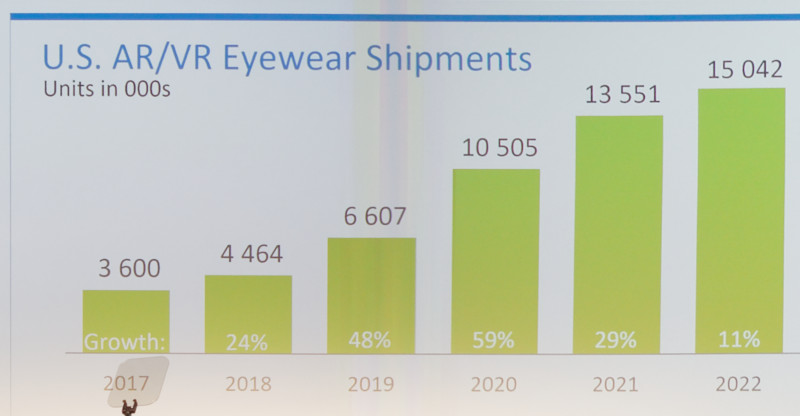 The CTA is optimistic about AR and VR. Image:Meko
The CTA is optimistic about AR and VR. Image:Meko
Koenig then turned to resilient technologies. In the tsunami – text warnings sent out but not always received
In medical digital therapeutics is a big trend because of the cost of chronic treatments is such a big deal.
There were questions on blockchain and also on environmental issues. CTA said that use of resources is getting more important and the CTA as an industry has adopted the targets of the Paris Accord on Climate. In response to a question about the need to ensure that technology is good for younger generations Shapiro said – technology is good and will make everything better and trust the market. (more or less)
Another question was whether a bigger CES event might come to Paris. Not necessarily, was the response. The aim is to get top executives to go to Vegas and cross industries and so there is less chance of another big event.
The CTA doesn’t seem to recognise digital HDTVs as a ‘must have’ category! Image:Meko

